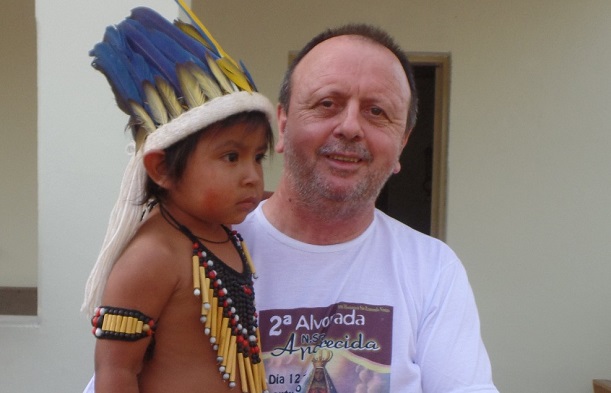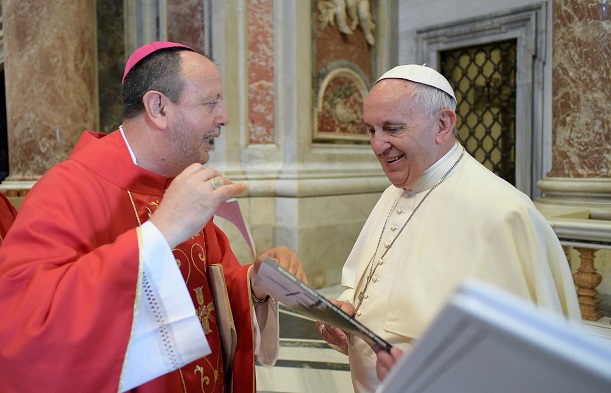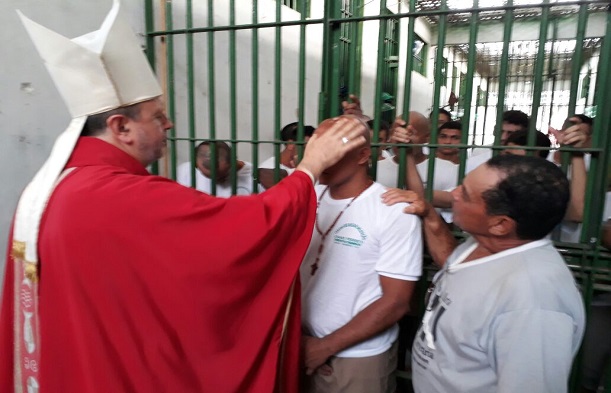“If someone is opening the doors of the Amazon Forest to the international capital, that is the current Brazilian government,” says Archbishop of Rondônia
Archbishop Roque Paloschi talks about the Synod construction, illegal deforestation, agribusiness, vulnerable populations and national sovereignty Photo: Personal Archive Living for 14 years in the Amazon region, Archbishop Roque […]
Publicado 20/09/2019
Archbishop Roque Paloschi talks about the Synod construction, illegal deforestation, agribusiness, vulnerable populations and national sovereignty

Photo: Personal Archive
Living for 14 years in the Amazon region, Archbishop Roque Paloschi, who is currently Archbishop of Rondônia and president of CIMI, Indigenous Missionary Council, has been following the social conflicts in the region since 2015.
He spoke with the Movement of People Affected by Dams (MAB) about the increasing advance of the Amazon forest deforestation as well as about the Synod organization, which consists of an assembly where Catholic bishops from all over the world discuss, for a period of time, the same theme defined by the Pope, intending to elaborate documents to guide the church practice.
In October, the final meeting of this edition will be held, and entitled “New Paths for the Church and for an Integral Ecology”, which focuses on the Amazon rainforest thematic. Recently, with the region highlighted in the international media, the Brazilian government brought criticism and attacked the religious initiative.
Keep up with the interview:
MAB – We live in a society in which dialogue is increasingly difficult. How important is the Synod in this context?
Dom Roque Paloschi – When we look at the Pope Francis journey, he has timely insisted for us to join an encounter culture. The Amazon is a plural region, embracing the existence of over 340 peoples, over 280 languages spoken, not to mention the voluntary isolated peoples, that is a contextualization of this pluralism. For those reasons the Synod becomes important as we learn from each other and build respect, cooperation, communion, solidarity and co-responsibility relationships, desiring to build a dignified life for us all. Then the Synod becomes important as it helps us to hear, to dialogue and to find in the other – who is different then me – a brother or a sister, not an adversary with whom I must create friction, but rather to build paths of hope and peace.
Regarding this Amazon edition, how did the theme formulation proceed?
When the Pope announced the Synod convocation on October 15, 2017, he noted that the request was received from several Episcopal conferences from the Pan-Amazon region to solicit him to convene a Synod for that region. It was all built on a two-way road, that is, also from the Holy See and the churches here in the Pan-Amazon region. The beginning of this complete process was precisely on January 19, 2018, when the Pope, visiting Peru, had as his first act a meeting with the indigenous peoples, the original peoples, in Puerto Maldonado. One lady said, ‘Francis defends us, they want to eliminate us, if we lose our territories we will disappear’ and the Pope then, in his speech, established the coordinates for the Pan-Amazonian Synod, when he said that indigenous peoples are the first to be heard for their traditions, their experiences, and above all for their lifestyle that does not align with this worlds disposable consumption, but a life of happy sobriety. We can say that this day was the beginning of the Synod theme construction ‘New Paths for the Church in the Amazon and for an Integral Ecology’. The complete process was fundamental to us all.
The Brazilian government, which is publicly opposed to the recognition of indigenous rights, enunciated statements of ‘concern’ about this Synod theme. Why?
I do not know what the government is concerned about, even because the Synod was convened in 2017, when we still did not know for sure who would be the presidential candidates of the Brazilian republic. The pan-Amazon region embraces nine countries, so the church is not concerned with the government of Brazil, Venezuela, Colombia, Peru, Bolivia, Ecuador or Guyana, the church is concerned, yes, with suffering, with pain, with marginalization of poor people from these countries. The church is concerned, yes, with the environmental destruction, with the violence we live in this region, with the projection of looking at the Amazon as a backyard where we can take everything we need without the awareness that one day it will become scarce. I do not know what the government is concerned about, but the church is moving very serenely because, throughout history, the church has given its witnessed of commitment in promoting life and hope of the Amazon peoples. Now, the church also cannot be indifferent when the rights of people, of the community, are not being respected.

Photo: Vatican News
For you, who accompany the daily conflicts in the region, what is the main social problem of the Amazon? Who are the vulnerable populations?
We can say that the social problems in the Amazon are many, given the 14 years I have lived in the region. We can say that there is a great absence of the Brazilian State, and because of that, the region is popularly named as ‘no man’s land’, that is, a land of dispute, on which greater strength means greater power. We need to be aware that in the Amazon there is an increase in public lands occupation, illegal deforestation, invasion of already demarcated indigenous lands and the establishment of monocultures with abusive use of pesticides leaving an enormous death trail. Grows in the Amazon, a mentality defending that native people are incapable and the lands where they live must be occupied as they do not produce in it. That is why social problems in the Amazon are so serious, and it demands mediation from the government, so the law can work in favour of life, and everyone’s life, then the laws enforced. We cannot continue with this impunity practice. Still, grows a perspective of thinking aiming enormous projects which respects nothing, no legislation, and brings disastrous consequences, either for the environment, or for the poorer people who are the least respected according to their rights.
What is your evaluation about the progress of agribusiness and mining in the deforestation of the Amazon Forest in recent years; and in the current government? How does it happen? Is there a dialogue or public policies for local people?
There is a way of thinking that the Amazon Region is the last agricultural reserve, evidencing two distinct perspectives of development. The predatory model, which destroys everything, that respects nothing, that puts the Amazon forest on the ground, burns, sows pasture for cattle and then it brings monoculture, soybeans, and also other cultures, like sugarcane and eucalyptus. It all together represents worrying consequences for the region. Regarding public policies, when we look at the Amazon cities, for example, access to basic sanitation and drinking water achieve very low levels. After 31 years from the Federal Constitution promulgation, the vast majority of Indigenous and Quilombola lands have not been demarcated; there are no study groups, no technical procedures. Even if the constitution predicts that indigenous peoples have a differentiated education, it is actually very difficult to apply it because a law of least effort prevails, and the less investment the better. It is not wanted these populations to grow and to be protagonists of their stories. This advance in the Amazon deforestation is not by chance, it is a complete project underway, with the understanding that if the forest area does not produce large-scale for exportation, Brazil can look bad in the picture. It is important for people to know that are the small farms that produce food to put it on the households tables. People do not just use soy oil, soy meat or soy milk, Brazilian families eat much more than that. We do not only use this or that product from sugarcane or from eucalyptus product. That is why the advance of agribusiness also impoverishes the table of small families, which means, our food. This is worrying. Dialogue is very difficult because it must happen on an equal baseline, and today the poor are increasingly being chased away and thrown into a street of bitterness with nothing. As we have observed in the labour and pension reforms, it all demonstrates an income concentration in a few hands growing alarmingly, and we just find it all normal. I remember what the Pope said in Bolivia ‘No family without a home, no peasant without land, no worker without rights’ this is the big challenge.

Photo: Archdiocese Rondônia
Regarding the growing deforestation, proven in numbers, what are the prospects for the next period? How can environmental discussion within the church help in this debate?
It must be said that the Pope’s encyclical about the Common House is very strong. We have very rich documentation; our problem as Catholics is practice. Over the last few years, the Brotherhood Campaign developed annually by the Brazilian National Conference of Bishops, repeatedly, has dealt with what concerns to the common house, the issue of land, water, biomes, the Amazon, indigenous peoples, and several Thematic. We have been feeling in Rondônia, in a very visible and palpable way, the growing number of streams annually drying in the state. They dry up, not because there is a rage from God, but because of our irresponsibility in deforestation, in not respecting the river sources and riparian forests, as predicted by our codes, written with so much sacrifice. But now, everything has been made flexible and there is an incentive from the President for this practice that is scary, right. When we hear what has been done, in Para and elsewhere on the same day, with the fires, it all reveals a destructive mindset and irresponsibility from all of us toward our responsibility to future generations.
What is your opinion about the threat to national sovereignty that surrounds the Amazon, are we at risk?
I would like to say that it is not the NGOs, and it is not the church that is internationalizing the Amazon, it is the Brazilian government, with the National Congress and with the consent of the judiciary. Who is opening the Amazon to international mining companies is the government, who is willing to sell land in the Amazon region to foreigners is not the NGOs, it is not the church, it is the Brazilian government itself. Who is handing over the Alcantara aerospace base with a shameful agreement between Brazil and the United States is the government of Mr. Jair Bolsonaro. So, this internationalization is, above all, by this government, which has no courage to defend national sovereignty, and submits itself in an inconsequential way to the American government, to American money. It is unfortunate. If someone is opening the doors of the Amazon Forest to the international capital, that is the current Brazilian Government
How important is the participation of social movements with the church in the Synod?
We can say that the church’s greatest mission is to witness hope, to defend the threatened life, the lives of people and all creation. Social movements also have this commitment to upholding justice, dignity, the dreams of the poor, and why not to say the dreams of creation itself. It is very important in this process of listening, in Porto Velho, we had this beautiful experience with various social movements that were present and continue participating in the Synod discussions. All of it enriches us in this two-way path, where no one is master, we are all students of this school of hope, brotherhood, dreams, where another world is possible, overcoming a world that has excluded, a system that has excluded and killed, to a path where everyone can sit around the table. We are extremely grateful for the social movements contribution. As the interview is for MAB, I would like to highlight in a special way our brothers in Rondônia who have a very mature presence and desire to walk together, where there is no spotlight dispute between church and social movements.

